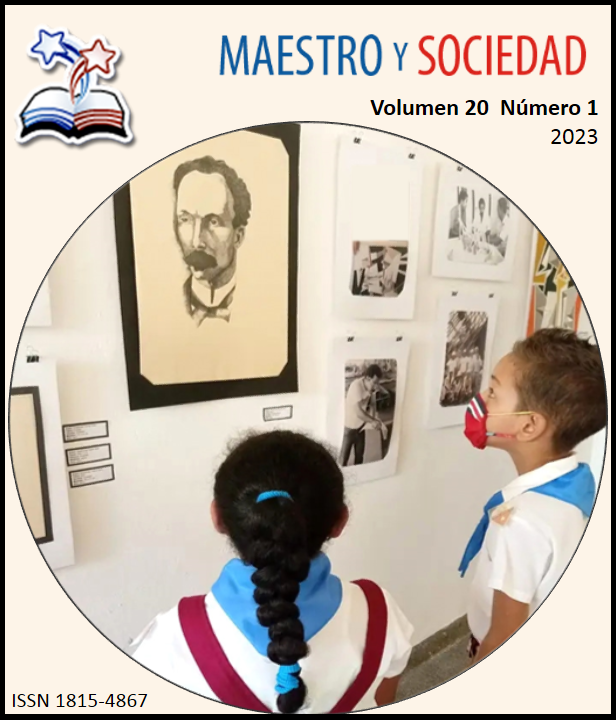Orientation to families in times of Covid: a challenge for early childhood educators
Orientation to families in times of Covid: a challenge for early childhood educators
Keywords:
family orientation, early childhood, Covid-19, Educative technologyAbstract
Introduction: The family is the first space where children develop socially from a certain family functioning, for this reason a stable and significant relationship must be maintained with them, which contributes to mutual support in their learning process.
Materials and methods: This research was made up of the participation of parents of the 5th year of life of the Pequeño Socialista Kindergarden in the José Martí urban center during the period September 2020-June 2021. For its development, the exploratory analysis-synthesis methods, participatory scientific observation and socialization workshops were used.
Results: An interview was conducted with the 34 parents that make up the 5th year of life classroom, which 58,8% and 20,5 % are always and almost always present before an educational professional orientation and support institutional management.
Discussion: The concept of parental participation in the teaching-learning process: perspective of committed agents, expresses that over the last few years a necessary change has been made in education, promoting towards an objective that was to achieve quality education and warmth.
Conclusions: It is necessary that parents continue to support their children, since with their collaboration in the different school activities the academic success of the students is achieved, that is why they must actively participate in the learning process of the students. boys and girls, because they are the main axis of educating their children.
References
Aguilar Gordón, F. R. (2020). Del aprendizaje en escenarios presenciales al aprendizaje virtual en tiempos de pandemia. Estudios Pedagógicos, XLVI(3), 213-223. https://scielo.conicyt.cl/pdf/estped/v46n3/0718-0705-estped-46-03-213.pdf
Aquino Canchari, C. R. y Medina Quispe, C. I. (2020). COVID-19 y la educación en estudiantes de medicina. Rev Cubana de Invest Bioméd. 39(2):e758. http://scielo.sld.cu/scielo.php?script=sci_arttext&pid=S086403002020000200010&lng=es
Bedford, J. et al. (2020). COIVD-19: towards controlling of a pandemic. The Lancet, 395(10229), 1015-1018. https://doi.org/10.1016/S0140-6736(20)30673-5
Calvo M. I., Verdugo, M. A. y Amor, A. M. (2016). La Participación Familiar es un Requisito Imprescindible para una Escuela Inclusiva. Revista Latinoamericana de Educación Inclusiva, 10(1), 99-113. www.rinace.net/rlei/
Canalda Benítez, M. E. (2015). El educador preescolar, su preparación para la orientación a la familia. Revista Varela, 1(40). http://www.revistavarela.uclv.edu.cu/index.php/rv/article/view/216
Chavarro Olarte, O. (2016). Rol que desempeña el profesor en la educación a distancia en la modalidad virtual: un estudio de caso de la especialización en pedagogía a distancia con apoyo de la tecnología de la Universidad Pedagógica Nacional. [Trabajo de magíster. Universidad Pedagógica Nacional de Colombia]. http://upnblib.pedagogica.edu.co/bitstream/handle/20.500.12209/848/TO-18929.pdf?sequence=1&isAllowed=y
Costa, M. J. y Carvalho-Filho, M. (2020). Una nueva época para la educación médica después de la COVID-19. FEM. 23(2), 55-7. http://scielo.isciii.es/scielo.php?script=sci_arttext&pid=S2014-98322020000200001&lng=es
Fernández Rodríguez, Y., Rojas Hidalgo, M. & Pérez Ortiz, M. (2019). La formación del profesional de la primera infancia para el ejercicio de la orientación familiar. LUZ, 19(1), 30-43. Recuperado a partir de https://luz.uho.edu.cu/index.php/luz/article/view/1012
Gutiérrez Duarte, A. S. y Ruiz León, M. (2018). Impacto de la educación inicial y preescolar en el neurodesarrollo infantil. Revista de Investigación Educativa de la REDIECH, 9(17). http://www.scielo.org.mx/scielo.php?script=sci_abstract&pid=S2448-85502018000200033&lng=es&nrm=iso
Linares Pérez, D. (2018). La orientación a la familia de los niños para el desarrollo de los juegos dramatizados. [Trabajo de Diploma. Universidad de Las Villas]. https://dspace.uclv.edu.cu/handle/123456789/10641
Marín Iral, M. del P., Quintero Córdoba, P. A. y Rivera Gómez, S. C. (2019). Influencia de las relaciones familiares en la primera infancia. Poiésis, (36), 164-183. https://doi.org /10.21501/16920945.3196
Palomeque García, I. J., Alfonso Moreira, Y. & López Rodríguez del Rey, M. M. (2018). La participación de la familia en la institución educativa: sus condiciones en el proceso pedagógico. Universidad y Sociedad, 10(5), 398-406. http://rus.ucf.edu.cu/index.php/rus
Pando, V.F (2018). Tendencias didácticas de la educación virtual: Un enfoque interpretativo. Propósitos y Representaciones, 6(1), 463-505. http://dx.doi.org/10.20511/pyr2018.v6n1.167
Razeto, A. (2016). El involucramiento de las familias en la educación de los niños. Cuatro reflexiones para fortalecer la relación entre familias y escuelas. Revista páginas de educación, 9(2). http://www.scielo.edu.uy/pdf/pe/v9n2/v9n2a07.pdf
Spiteri, J. (2021). Quality early childhood education for all and the Covid-19 crisis: A viewpoint. Prospects. https://doi.org/10.1007/s11125-020-09528-4º
Sugve Aleaga, I., Peña García, A. & Figueroa Corrales, E. (2019). La tecnología educativa como herramienta para la preparación de los profesionales de la primera infancia. Maestro Y Sociedad, 16(1), 133-142. https://maestroysociedad.uo.edu.cu/index.php/MyS/article/view/484
United Nations. (2020). Shared responsibility, global solidarity: Responding to the socio-economic impacts of COVID. https://unsdg.un.org/sites/default/files
Downloads
Published
How to Cite
Issue
Section
License
Copyright (c) 2023 Bárbara Mercedes Cuba Milá

This work is licensed under a Creative Commons Attribution-NonCommercial-NoDerivatives 4.0 International License.
This journal provides immediate open access to its content, based on the principle that offering the public free access to research helps a greater global exchange of knowledge. Each author is responsible for the content of each of their articles.



























 Universidad de Oriente
Universidad de Oriente 